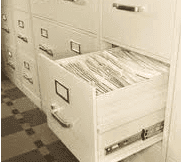Six months on from Australia’s dramatic and devastating floods, cyclones and fires, small businesses that were affected by these disasters are struggling to continue in business because of a loss of important records.
While it is impossible to plan for unexpected disasters, there are vital precaution that small business owners should take that will secure important records and documents.
There are four main types of records and documents that you need to have securely stored for your business:
- Financial records
- Employee documents
- Legal papers and business plans
- Your intellectual property and documents/templates that you need to service your clients and secure new ones.
Financial records
You are probably aware of the fact that the ATO requires records to be held for five years from the date of transaction. However, you may not know that there are situations where records must be kept for much longer periods.
Get in touch with your accountant to make sure you are storing the correct amount of paperwork and for the aright length of time.
Employee documents
All paperwork concerning employees including their annual leave, expense claims, performance reviews, minutes of meetings and superannuation documents should be kept even after an employee leaves. This will protect you in the case of disgruntled employees lodging false claims against your business – even after they have left.
Legal papers and business plans
All legal papers and business plans need to be stored in a secure and private place. This includes your succession plan, exit strategy, business insurance paperwork and personal insurance paperwork. You also need to make sure that a trusted associate or family member has a copy of these documents and is aware of the contents. Should something ever happen to you, they will need to contact the relevant organisation to lodge a claim on your behalf.
Your intellectual property and important documents
Can you even begin to imagine the drastic affect losing your intellectual property and important business documents would have on your business? It could result in lost clients, lost time, wasted money, unnecessary stress, and losing opportunities to your competitors.
How should you store these records?
Running a small business is complex enough without having to constantly worry about sorting through mountains of paperwork. Also, you must realise that storing all of your records in paper form is asking for trouble and leaving your business exposed to serious damage.
The solution is to switch to electronic record keeping. It is the safest, easiest and most efficient way of maintaining the necessary records for your business. The other benefit is that it sets you on your way to having an organised and paperless office. Not only is this good for the environment, but it allows you to secure, retrieve and back-up your documents.
If some of your records are still stored in paper form, you need to ensure they are protected. While you could keep the paperwork in paid storage, the safest option is to scan all documents into an electronic format.
The hard work will pay off as:
- your records will be safe, even in case of fire or other disasters
- you can retrieve all of your records
- your business can continue even in case of disaster
- the ATO can easily investigate your business.
Don’t forget that just like you and your office, computers are not bullet proof. You should always back-up your data on a regular basis. The more data you have, the more often you should back-up.
Consider online storage facilities such as Dropbox, Xero (for book-keeping) or Google Documents. You should always have a secondary back-up to a USB drive, CD-ROM or portable hard-drive. You may also want to keep a back-up on a second computer. Your portable back-ups should be kept in a location that is fire and flood proof.
As a small business owner, you owe it to yourself and your business to implement procedures that will reduce the amount of time spent dealing with your records, so you can spend more time growing your business.

